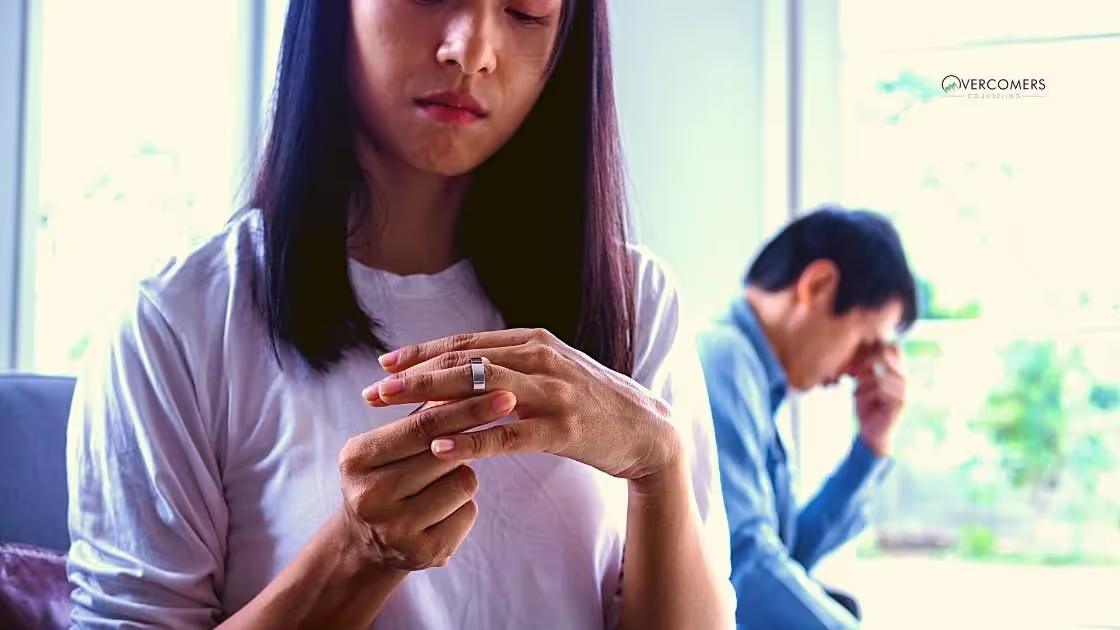Divorce can be one of life's most painful and stressful experiences.Often divorce means the loss of love, trust, companionship, financial security, routines...

Divorce can be one of life's most painful and stressful experiences.
Often divorce means the loss of love, trust, companionship, financial security, routines of home, family ties, and memories.
For many, divorce means feeling like you're starting over in life.
Divorce can make you feel a storm of emotions like fear, helplessness, low self-esteem, depression, loneliness, anger, bitterness, and resentment.
It's no surprise then that many who go through divorce suffer from divorce anxiety.
Divorce anxiety is common, both for those going through a divorce and for those who've already gone through it.
Divorce anxiety often causes serious mental, emotional, and even physical issues.
If left untreated, divorce anxiety may have devastating effects on your personal and professional life.
If you or someone you know suffers from divorce anxiety, seek immediate treatment from a licensed professional counselor.
Let's examine what divorce anxiety looks like.
Marriage means companionship, friendship, and intimacy.
It means sharing your life and dreams, the good times and the bad, with another person.
Those suffering from divorce anxiety often feel the painful loss of companionship.
Divorce anxiety can make you feel alone and abandoned.
We often take for granted having someone around to share a joke, listen to what happened that day at work, or just share a meal.
Divorce anxiety may disrupt all aspects of everyday life, causing you to feel out of place or lost in your life.
Divorce destroys normalcy, and therefore interrupts our comfort zone.
Divorce anxiety means missing your partner in every way possible.
Feelings of loneliness may be as simple as missing everyday conversations with your partner, or missing their advice and support when making difficult choices.
Another symptom of divorce anxiety is missing intimacy.
Intimacy can mean many things, from a gentle hand on the shoulder to making love.
It can also be as simple as missing the physical presence of someone sharing your bed.
It's not uncommon for divorce anxiety to cause physical illnesses like insomnia, loss of appetite, fatigue, or chronic pain.
A licensed professional counselor can provide guidance when missing your partner seems too much to bear.
It's common for divorce to cause a shift or loss of security.
It's no surprise then that divorce anxiety may make you feel afraid, nervous, and vulnerable.
Money isn't everything- but finances are important.
Loss of security can often mean financial uncertainty.
For many enduring divorce anxiety, worrying about bills, the division of assets, and future income is a serious concern.
How will I pay the bills?
Which routines, services, and/or activities will be changed or canceled?
Who gets what?
Will my future income change or be enough for my lifestyle, or that of my family?
Divorce anxiety raises all of these difficult questions and many more.
Counseling can provide you with strategies for how best to answer these troubling questions.
Divorce anxiety often means feeling displaced from your home life and even from family ties.
They say home is where the heart is…
Sadly though, divorce often means a broken home, and feelings of a broken heart.
Part of a marriage is making a home, creating a space where you and your partner can feel safe, secure, and comfortable.
Your home is often a reflection of you and your partner, from décor to what's in your fridge.
Moving out or being left behind when your partner leaves home can be a traumatic experience.
Divorce anxiety often causes overwhelming feelings of abandonment, estrangement, and even betrayal.
When you move out and lose your home, it can feel like losing a part of yourself.
And when a partner moves out, it can feel like they take part of your home with them.
Those suffering from divorce anxiety often grieve the loss of family members tied to the divorced partner.
It's common for people to forge friendships and relationships with family members of their partners.
But these relationships are often difficult to maintain during and after a divorce.
Those suffering from divorce anxiety not only struggle with losing their partner but suffer the loss of people who feel like family too.

When you share a life with someone, you share memories.
How many times do we ask a partner something like this- Remember that time we walked on the beach in that little town by the marina?
Or shared a favorite romantic restaurant, or took that little road trip, or watched the fireworks…
Memories, especially treasured memories, are a vital part of what ties us together with our partners.
Memories can be like glue holding a relationship or marriage together.
Divorce often means that shared, treasured memories seem tainted somehow.
For those struggling with divorce anxiety, not having a partner to share memories or reminisce with may cause feelings of panic.
Divorce anxiety may mean feeling stressed about returning to a favorite restaurant without your partner, or severe sadness when avoiding the restaurant altogether.
Divorce anxiety may include feeling like it's not okay to mention memories with an ex, or feeling overwhelmed by sadness when you do.
Memories are part of what makes us who were are.
A professional counselor can guide you through grieving the loss of memories due to divorce and help you find healthy ways of making new ones.
For many, divorce feels like being forced to start over.
Divorce anxiety can make you feel afraid of the uncertain future, while at the same time mourning your past.
Marriage often means working towards shared goals.
And when you accomplish those goals together, it brings you closer.
However, for those struggling with divorce anxiety, the anxious feeling of starting over in life can be paralyzing.
Divorce is a rock and hard place.
You're expected to leave parts of your life behind, while at the same time creating new ones.
Divorce anxiety can make everyday life feel like a delicate, depressing balancing act.
Starting over often means learning to be alone, and face hardships alone.
The symptoms of divorce anxiety are often debilitating and make the starting over process even more difficult.
It's not surprising that one of the main symptoms of divorce anxiety is depression.
If you or someone you know is experiencing depression, lethargy, or fatigue due to divorce, seek immediate treatment from a licensed professional counselor.
Divorce can have destructive and debilitating consequences on your personal, professional, and even spiritual life.
Divorce anxiety may wreak havoc with your mental, emotional, and even physical health.
Those suffering from divorce anxiety may not even realize it, too overwhelmed with the fallout from their divorce.
Licensed professional counseling can help you navigate the stormy waters of divorce.
Whether you're going through a divorce or already done, it's never too late to seek treatment and help.
A professional counselor can provide the advice, support, and encouragement you need to overcome divorce anxiety.
Other activities which have been found helpful in reducing both immediate feelings of anxiousness and long-term anxieties associated with chronic disorders include yoga, journaling, nature walks, art therapy, volunteering, and other low-stress activities. Additionally, developing a healthy lifestyle incorporating adequate sleep, physical activity, and nutritious meals can help reduce overall stress levels.
Ignoring anxiety can exacerbate symptoms and make it more challenging to manage over time. This can result in a negative impact on your personal, professional, and social life, leading to feelings of isolation and even depression.
Addressing anxiety is crucial because it can significantly impact your quality of life and overall well-being. Left untreated, anxiety can lead to more severe mental health issues, relationship problems, and difficulty functioning in daily life.
It's important that you feel comfortable discussing personal matters with your therapist in order to open up and get more out of therapy sessions; therefore finding someone who meets certain criteria like experience level, expertise areas, and personality is key when selecting a therapist who can give meaningful feedback about how best handle issues related to anxiety or other mental health concerns.
The duration of anxiety counseling varies for each individual, depending on the severity of their anxiety and their progress in therapy. Our therapists will regularly assess your progress and adjust your treatment plan as needed.
Yes, Medicaid provides insurance coverage for therapy services specifically designed to help individuals struggling with anxiety, depression, and other mental health conditions.